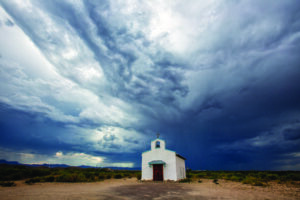
By Josh Meier
Permanent state or Temporary circumstance?
Someone once said, “Socialism never took root in America because the poor see themselves not as an exploited proletariat, but as temporarily embarrassed millionaires.”
The difference is thinking of poverty as an intrinsic quality versus thinking of it as a temporary circumstance.
While that attitude may have been pervasive among the poor in America, it is sadly lacking among many, if not most, small church pastors.
We often consider church size a matter of intrinsic quality, rather than a temporary circumstance.
A church that embraces the clear, simple message of eternal life by grace through faith, has no intrinsic limitation on its growth.
Quite the opposite.
Clarity in understanding and teaching the gospel is a powerful instrument. And yet, it is rare for a Free Grace church to be above average in size.
I can hear the protests now—“It’s not all about the numbers!!!”
It isn’t? Not even when every number is a unique person to whom God has extended His grace?
Don’t Fall for Pride
Sometimes we are afflicted by something I call the “Pride of Puny Purity.”
This is when we rationalize and revel in the thought that a church is—and may always be—small because of their doctrinal or practical purity. While this thinking is common, it is unbiblical.
Life reproduces.
That is one of the intrinsic features of life.
If it does not reproduce, either the life itself is deficient, or the environment is.
None of us would dare say that the life granted by believing in Jesus is deficient in any way. So we are left with the fact that if that life is not reproducing, then the environment must be deficient. Some people may think that sounds pessimistic, but it is actually optimistic. Why?
If you have realized the problem is the environment, then you have realized that what needs to be changed, can be changed. As with many things, it is not a matter of resources, but of volition and consistency.

You Are What You Think
Small churches that “think small” stay small. Small churches that “think big” grow (whether virally or not).
By “thinking big” I don’t mean that a fifty person church should waste time implementing structures necessary for a church of five thousand. But it would be wise to implement structures necessary for a church of one hundred and fifty or two hundred.
Exactly what those structures are will be different in different contexts and with different personalities.
So, what’s the obstacle to changing the environment to plan for growth?
To quote G. K. Chesterton, “If you could kick the person in the pants who caused most of your trouble, you wouldn’t sit down for a month.”
Generally, we are our own greatest obstacle.
Perhaps we are stricken by a potent cocktail of adult ADHD and compassion. This inevitably leads to constant distractions with minor issues, but “plausible deniability” when it comes to accountability about our time management. In other words, it lets us make decent sounding excuses.
Part of the problem is that we’ve been often told that our ministry as pastors is not really substantially unique within the body (most often by people who would never dream of serving in the role). That leads us to give too much weight to other people’s “suggestions” about ministries and direction.
Another problem is that we often make decisions based on emergencies, not principles.
Emergencies are emergencies. They require immediate action and the decisions are not always what we would make in normal circumstances. However, every shed tear does not meet the definition of urgency.
Urgent situations demand different decisions than normal ones. However, a commitment to making decisions based on principles, decreases the frequency of urgency’s demands.
Choose Your Ruts
I’ve been told that there is a “road” in Alaska that has at its beginning a sign that reads like this, “Choose your ruts wisely; you’ll be in them for many miles.”
That should be applied to a lot of our choices in ministry. However, pastors ought to phrase it a little differently: “Choose which ruts you make wisely; you may never get out of them.”
You might assume that small churches are more nimble and responsive than larger ones. In my opinion, that is far from true. A small church can stay in a rut just as long as a larger one.
Often, a small church makes a rut in a single pass, out of a decision a large church doesn’t even remember they made.
Here in the river valley of El Paso, Texas, we are in our monsoon season. The valley is made up of silt laid down over and over by the Rio Grande as it continually flooded its banks. In that damp silt, a bicycle tire will lay down a much deeper rut than a tractor tire will.
A small church is like that bicycle tire; it makes a deep rut in a single pass. It is our job as pastors to make sure that those ruts are in the right places, going in the right direction. We must ensure our ruts are made by principles, not by urgencies.
What Works for Me
I was recently handed a booklet called “What Worked for Me” by a well-known evangelist in El Paso. The author said, “This is what worked for me, it may or may not work for you.”
Read this next section in the same spirit. These things have worked for me as I have tried to make the right, principled ruts. They may not work for you.
First, solicit less input. Soliciting less input means fewer meetings. The meetings we have are short, efficient, and direct. Those meetings have fewer people in attendance, but nearly one hundred percent of those invited.
Second, give less input. The rut we generally make is to funnel too many decisions through ourselves, formally or informally. The key to this one, frankly, is to care less about most things (because most things aren’t worth the time).
Third, actually delegate. Once we have delegated a responsibility or ministry, the line item veto is anathema. The delegation contract is useless if it does not include the responsibility to both trust and to defend the delegate. We should never even think to utter to a single third party, “That’s not what I would have done, but…” Instead, it would be a far more principled position—or rut—to repeat all the reasons why that delegate is trusted.
Again, this is not about avoiding ruts; it’s about making the right ruts. Principled ruts decrease the frequency of urgency’s demands.
Know Where to Take a Stand
I pastor a small church.
I preach and teach a principled message of God’s Free Grace in a methodical manner.
If you read Grace in Focus, you’re probably like me, at least in this one way: the doctrine of grace is a hill you will die on. Nearly every Free Grace proponent I’ve come across would die on that same hill.
I would not dispute that necessity.
However, in the words of the great cowboy philosopher Augustus McCrae, “It ain’t dyin’ I’m talking about, it’s livin’!”
It is important to know on which hill to die. It is equally important to know on which one to live.
The clear, simple message of grace is enduring and intrinsically powerful. But our circumstances and environment are incidental and intrinsically mutable. If your current church environment is not conducive to growth, then change it.
We ought to live like that is true every day.
____________________
Josh Meier is pastor of El Paso Bible Church. When he is not studying the Word, you can find him milking goats, making cheese, relocating bees, welding, or shooting at the rifle range.
